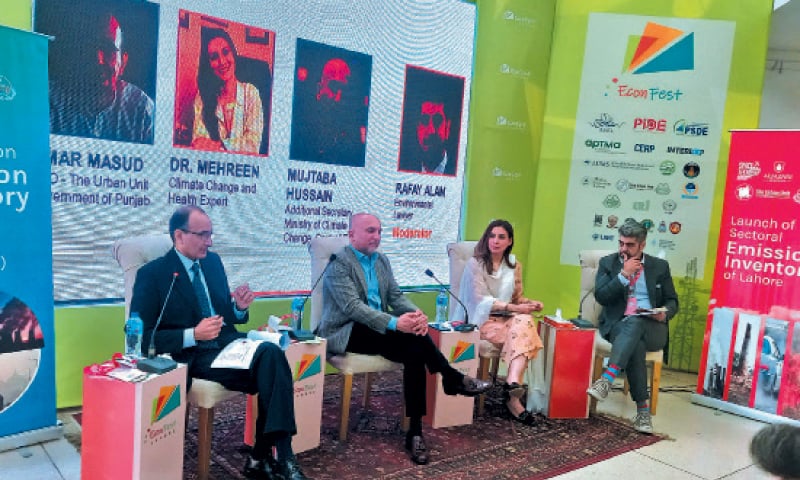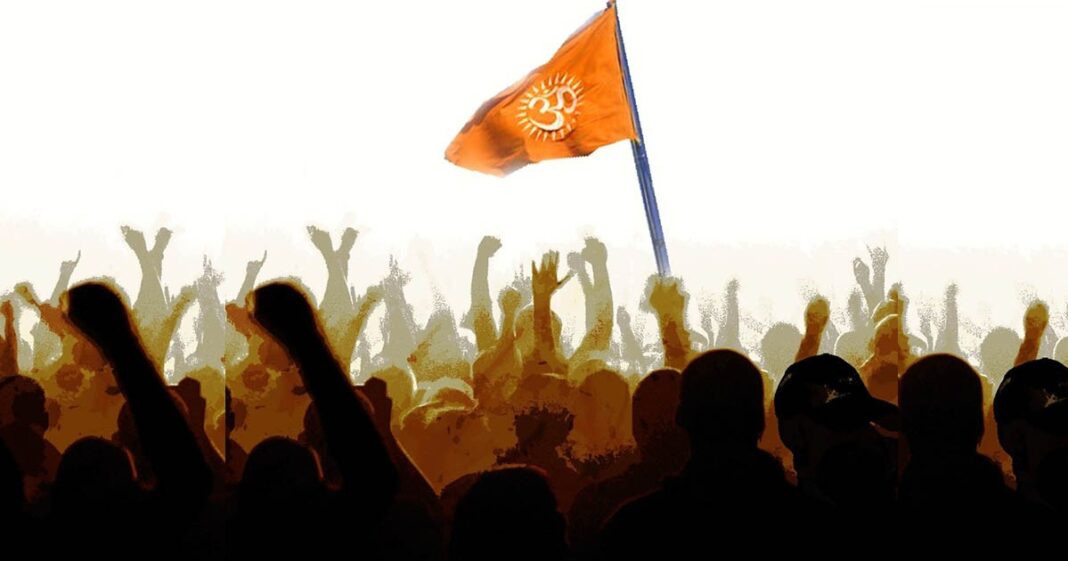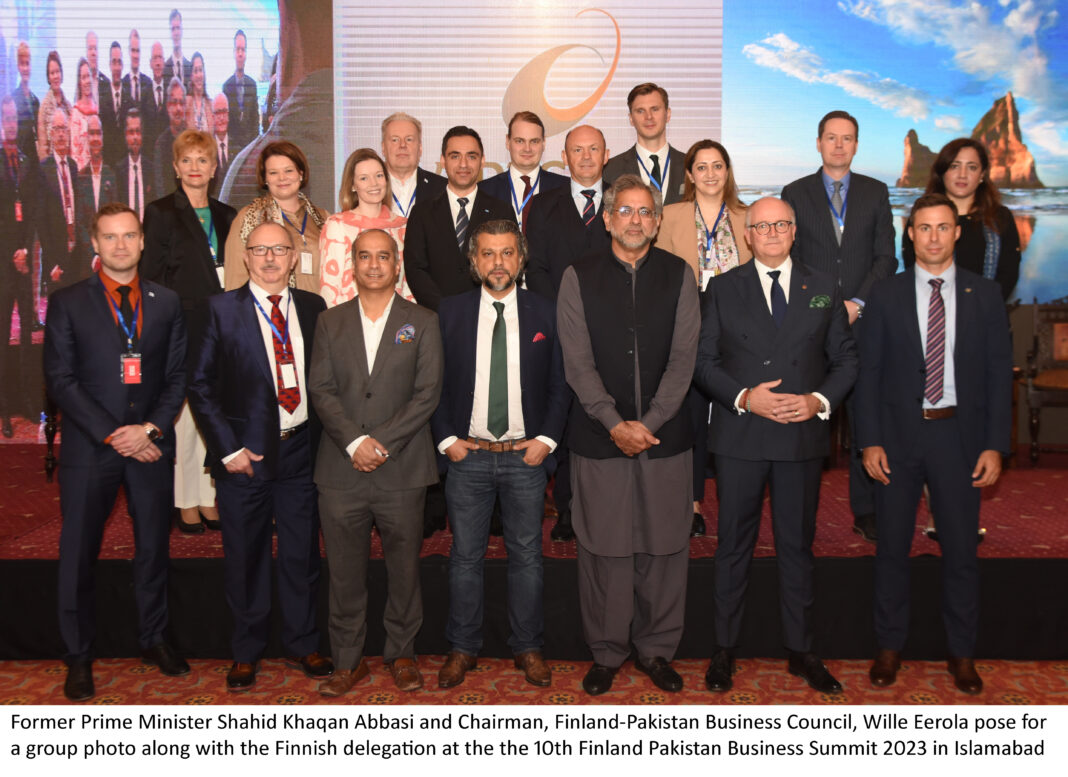NEWS DESK
LAHORE: A two-day festival, named EconFest being organised by the Pakistan Institute of Development Economics (PIDE) kicked off at Alhamra Art Centre, Mall Road, on Saturday. Sessions on myriad topics like economic and energy crisis, investment, identity, agriculture, climate and education were held.
Moderating the session on ‘climate change and resilient cities’, environmental lawyer Rafay Alam said the climate change and greenhouse gases were disrupting the weather system, which was balanced since the last ice age. Giving an example of the hot weather conditions in early March in Lahore, he told the audience that it was actually going to be the coolest summer for the rest of their lives.
“The Pakistani cities are right in the middle of several fault lines regarding climate change, which has brought increasing heat and unbearable air pollution in some of our cities. The question is how should our cities respond as about fifty percent of the population lives in urban areas.”
Omar Masud, the CEO of Urban Unit, said that the issue of climate change is not known at the grass root level. That’s why there was no voice at their level regarding climate change. “The question is how do we contextualise climate change within cities,” he said, suggesting that a talk on climate change in Lahore should focus on the city itself and its neigbourhoods being affected by the weather conditions.
He pointed out that climate change was being discussed at the federal level as well as at the provincial level but there was hardly any talk at the local level, which was a challenge.
Mujtaba Hussain, the additional secretary of the ministry of climate change, raised the issue of lack of proper understanding of the climate change at the federal as well as provincial level, saying that absolutely nobody understood this issue at the local level.
“The message has to go down to the tehsil and union council level,” he suggested and added that it was the responsibility of the government to mainstream climate change into the development process.
Dr Mehreen Mujtaba, a health expert, said there were more than 0.8m deaths worldwide due to climate change. She said Ella in the UK was the first person who died due to air pollution and the world came to know the real implications of the climate change. She referred to a recent research done in Lahore, showing 5,000 premature babies deaths attributed to air pollution.
Omar Masud said the more spread out city would have more effect on climate change. Stressing public transport to reduce pollution caused by cars and personal transport, he said the Walled City of Lahore, the denser part of the city, was contributing less to the pollution as compared to the rest of the provincial capital where upper middle and upper classes lived.
Rafay Alam pointed out that property developers had used their political leverage to make roads to their housing schemes signal-free and to get all municipal services. He said the cities like Lahore were being developed for the elite which is causing more pollution.
In the opening session of the EconFest, titled Coming out of Boom and Bust, Dr Nadeemul Haq said Pakistan was facing a disease and the IMF tranches were of little help. He urged the youth to take things in their own hands.
He said they tried to promote entrepreneurship in Islamabad near Quaid-i-Azam University and the government dislodged all the small businesses and vendors. He stressed the need for right policy-making which was a difficult thing to do. He said the universities were involved in evaluation and research for making policies across the world while in our country the section officers were doing it.
Dr Durre Nayab said there was a strange situation in Pakistan. “We interview people but don’t get the right candidates and the right candidates don’t get employment.” She said the teachers were not giving the relevant education to the youth and the teachers were repeating the same notes for their lectures every year.
Dr. Faheem Jehangir Khan said 31pc of educated youth in Pakistan was unemployed while 67pc of the youth wanted to leave Pakistan. “We have to discuss population and issues of youth to find solutions. Pakistan had more than 200 universities which were giving degrees to hundreds of thousands of youth but a degree is not a guarantee of employment. The employer demands skill beyond theory.”
He said there was a responsibility on the teachers but the students would have to be active and turn towards entrepreneurship. “Why everybody wants a job, why can’t you be entrepreneurship?” he asked.
Dr. Khalid Mushtaq of the UAF, in a session on ‘agricultural diversification for food security’ said Pakistan was spending USD 4bn to import edible oil but the country could diversify its crops to control such spending.
He revealed that the main emphasis in the country had been on wheat and the Punjab govt had spent Rs4,000bn on wheat procurement in the last 15 years. He asked why the people were being compelled to consume wheat only as wheat and rice were full of carbohydrates (sugar) which were affecting public health. “We should move towards protein rich food.”
Dr Mushtaq added that oil seeds could not be developed due to competition with wheat which was a protected crop. He said work was being done now on hybrid seeds. He said soybean could be grown throughout the year in the country. He said only basmati rice should be protected and focus on it should be diverted to other cheap crops. “There are new varieties of cotton, which could be grown in February and harvested before June.” He called for relaxing government control on markets too and growing of crops.
Nihal Ahmed Khan said soybean was already a part of our diet as we were trying to achieve some dietary diversity. He called for introduction of GM (genetically modified) seeds which was totally a different ball game as codification of GM laws in Pakistan was non-existent. “There is no legal cover for development of GM as our labs and scientists don’t have permission to develop GM varieties. We are relying on the US, Brazil and Argentina to give us GM varieties.” Khan pointed out that the hurdles to more soybean production was our inability to develop its varieties.
Dr Zaheer Ahmed of the UAF said Pakistan was importing soybean oil worth 1.5bn USD for the poultry industry and we did not have any other use of soybean oil in Pakistan at present while in the world the oil was being used in 400 different food industries. He said soybean was the only crop which could offer 7bn USD import substitution per year.
Asghar Ali of the UAF and Mansoor Ali, an independent consultant, and University of Agriculture Faisalabad Vice Chancellor Iqrar Ahmed Khan also spoke in the session moderated by Prof Asif Kamran.






